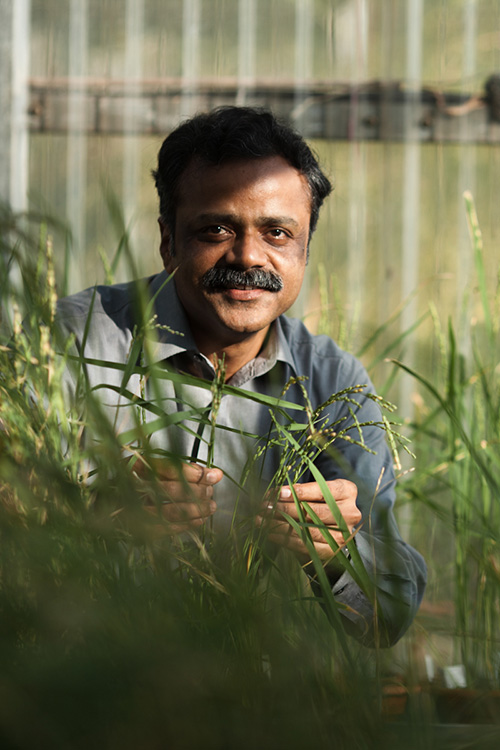
Impact
Improved growth, yield and immunity in crop plants achieved by understanding cell signalling and metabolic programmes across biotic interactions between microbes and plants. Disease prevention, specifically blast in rice and wheat; root and basal stem rot in sugarcane; as well as the root rot and wilt disease in green leafy vegetables, can be achieved by harnessing novel agro-technologies, and beneficial microbiomes and small molecules as probiotics, to sustainably increase productivity and resilience by up to 35% in urban farmed crops of importance to Singapore and Asia. Microbiomes and modern agronomy can help mitigate climate impact via decarbonized agriculture.
Collaborations, Achievements & Honours
- Granted food security research projects by the National Research Foundation Competitive Research Programme (2012 and 2016) and Singapore Food Agency (2023-2025)
- Commercial research on sugarcane crops by PT Gunung Madu Plantations, Indonesia (2021-2027)
- Global research collaborations across Singapore, Asia, UK, Israel and USA since (2005)
- Associate Editor at Fungal Genetics & Biology, PLOS Genetics, PLOS Pathogens and Frontiers Immunology
- Keynote and plenary speaker at scientific conferences
- Elected member, International Rice Blast Policy Committee
- Knowledge partner (via TLL), World Economic Forum, First Movers Coalition for Food.
- GAEA award 2025 finalist/winner, World Economic Forum, for the Decarbonizing Rice project.
Research Areas
Microbes-plants-environment interactions, Microbiomes, Sustainable crop improvement, Precision Agrobiology
Affiliations
- Temasek Senior Investigator, TLL
- Adjunct Professor, Department of Biological Sciences, NUS
Question
How can crop production be sustainably improved by harnessing cell signalling and metabolic programmes in microbe-plant-environment interactions?
Approach
Naweed’s Lab utilizes an integrated strategy of microbiomes, molecular genetics, cell signaling, chemical biology as well as novel biotechnological and multi-omics tools to precisely enhance yield and resilience in important food crops. The long-term goal is to enhance food security and build climate resilience in agri-food systems while mitigating climate impact in a sustainable manner. Naweed Lab harnesses plant-microbe systems and biotic interactions to enhance crop productivity via improved growth and stress resilience. Strategically apply their molecular understanding of intra- and interkingdom biotic exchanges (beneficial and pathogenic) to:
- Improve disease resistance in urban and traditional crops.
- Identify plant growth-promoting microbes
- Identify biocontrol agents against fungal diseases in important crops
- Provide microbial solutions for climate-proof and stress-resilient crops for next-generation sustainable agriculture
Naweed’s lab explores the basic molecular-genetic mechanisms underlying fungal pathogenesis and host-pathogen interactions, with the aim to discover specific signalling and metabolic programmes evolved by fungal pathogens that infect and colonise host tissues. The lab utilises the blast fungus, Magnaporthe oryzae, and its major host, rice, as a model pathosystem for fungal virulence and host specificity. Molecular genetics, cell biology, systems biology, chemical biology and synthetic biology approaches are also adopted for the understanding of infection-related development and fungus-plant interactions to develop novel antifungal agents for disease control. While natural variation in blast populations and the extent of blast resistance or susceptibility in rice/wheat cultivars are being investigated, Naweed hopes to develop rapid diagnostics for precise detection of important fungal pathogens, in particular Xylaria and Magnaporthe, under field conditions. The lab looks forward to developing next generation research specialists in precision farming and agri-biotechnology, as well as extending external collaborations to local and international agencies..
Naweed’s lab identified several beneficial fungal and bacterial isolates that can significantly improve disease resistance and crop yield in urban (leafy greens) and traditional crops (rice and sugarcane). Some of these biomes have been successfully tested under field trials in farms and plantations.
In the Decarbonizing Rice project (funded by Temasek Trust, Philanthropy Asia Alliance, Bill & Melinda Gates Foundation, Bayshore Global), Naweed Lab is involved in harnessing beneficial microbiomes, plant physiology and modern agronomy to reduce methane emissions and water use while improving rice production in a nature-based sustainable manner.
Bio
Naweed obtained his PhD at the Maharaja Sayajirao University of Baroda and the International Rice Research Institute in 1995. He was a Rockefeller Foundation Fellow at IRRI until 1997, before moving to the Singapore Institute of Molecular Agrobiology for a postdoctoral stint in eukaryotic cell division. Subsequently, Naweed started an independent research group focusing on fungal patho-biology and plant immunity, and joined TLL as a Principal Investigator in 2002. He is currently a Temasek Senior Investigator in TLL and an adjunct professor at NUS.
Distinguished TLL Investigator
Naweed Naqvi
The lab focuses on the basic molecular-genetic mechanisms underlying symbiosis, pathogenesis and microbe-plant-environment interactions for crop improvement and climate mitigation.

